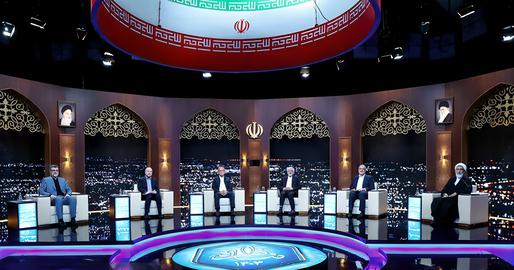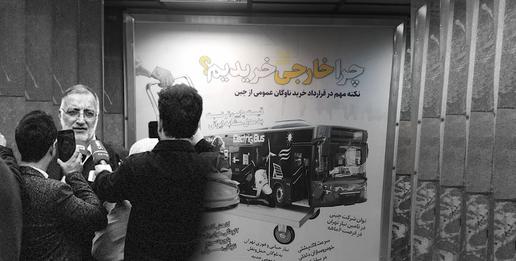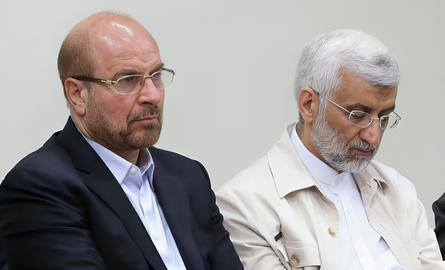The fourth debate among Iran's presidential candidates, held on Monday, centered on foreign policy but was overshadowed by acknowledgements of low voter enthusiasm.
The debate, like previous ones, began with questions from "experts" on "Foreign Political Opportunities and Capacities," but candidates often veered off-topic.
Mostafa Pourmohammadi addressed the lack of voter enthusiasm: "Unfortunately, we don't see an increase in participation."
"Polls remain close to initial numbers, similar to previous elections. I don't see any new feelings in society, which is Iran's major weakness today," he said.
"Elections are the country's political honor. The Islamic Republic was formed by people's votes and presence," he added.
Amirhossein Ghazizadeh Hashemi echoed these concerns, saying, "People were angry with the ballot box due to the existence of ambivalence."
While the debate was meant to focus on foreign policy, candidates often addressed other issues.
The impact of sanctions on Iran's economy and foreign relations was a recurring theme, though specific policy proposals were limited.
Pourmohammadi, previously accused by some candidates of involvement in the Crescent contract, defended the agreement signed during the presidency of Mohammad Khatami.
He accused Saeed Jalili and Alireza Zakani of contributing to its cancellation, causing significant losses to Iran.
Pourmohammadi called for a debate between the contract's opponents and Bijan Zanganeh, the oil minister under the Khatami and Hassan Rouhani administrations.
In response, Saeed Jalili claimed Pourmohammadi lacked knowledge about the contract, while Alireza Zakani asserted control over it and welcomed the debate.
A video of Zanganeh surfaced, where he criticized Jalili and Zakani for discussing the Crescent contract, and revealed he had challenged Jalili to a debate, accusing him of evasion.
The Crescent contract, signed in 2001 between Iran and the Emirati Crescent company, led to a legal dispute at the Hague Court after Iran's non-compliance.
Amidst the debate, Jalili reminded Pourmohammadi of his past role in investigating the contract's alleged corruption.
Pourmohammadi also revealed that as Interior Minister under Mahmoud Ahmadinejad, he aimed to organize civil society associations. Still, Jalili accused these groups of instigating a "velvet revolution" in Iran, prompting Jalili to label Pourmohammadi a "dreamer."
Zakani, shifting focus, attacked Masoud Pezeshkian's involvement in Khatami's government, alleging his participation in the Crescent contract represented "the biggest betrayal of the country," alongside contracts with Total and Statoil.
During a debate, Masoud Pezeshkian, the candidate supported by reformist parties, criticized the attacks by fundamentalist-backed forces on the British and Saudi embassies.
He urged accountability, stating: "They should say who climbed the wall of the embassies that created this problem for us in the global view?"
In response, Amirhossein Ghazizadeh Hashemi argued that the governments at the time could have prevented these attacks and criticized Pezeshkian for leveraging these incidents to target "revolutionary" forces.
Alireza Zakani added, "They said about going up to the embassy, I have neither confirmed nor denied anyone in my life," distancing himself from direct involvement.
During a debate, presidential candidate Ghazizadeh Hashemi asserted the strength of Ebrahim Raisi's government in diplomacy, citing the release of "diplomats" from Hassan Rouhani's government, including Asadollah Asadi and Hamid Nouri, through Raisi's diplomatic efforts.
Nouri had never worked in the Ministry of Foreign Affairs.
He was an assistant prosecutor at Gohardasht prison and was sentenced for his role in the execution of political prisoners in the summer of 1988, charged with war crimes.
He was released and swapped for two Swedish citizens imprisoned in Iran.
Additionally, two Iranian-Austrian citizens and one Danish citizen imprisoned in Iran were exchanged for Asadollah Asadi, facilitated by Oman and supported by Belgium.
The main focus of the 4th debate was the concerted attack by four fundamentalist candidates on Masoud Pezeshkian.
Mohammad Bagher Ghalibaf summarized his statement by accusing Pezeshkian's campaign of being akin to Hassan Rouhani's administration.
Ghalibaf further criticized Pezeshkian's team, expressing concern over the lack of emphasis on consensus and unity.
He argued that this approach would heighten tensions between people and institutions, ultimately resulting in the people's voices being unheard and their problems unresolved.
Ghazizadeh Hashemi stressed in the final part of the debate that those promising to lift sanctions had previously failed to do so, hinting at Pezeshkian's inability to deliver on such promises.
Alireza Zakani accused Pezeshkian of being closely aligned with Rouhani's government.
He criticized Rouhani's administration, claiming that Rouhani's "key" did not unlock any solutions but rather caused more issues without resolving existing ones.
In response, Pezeshkian refuted these criticisms, stating that he never sought to engage in the debate by repeatedly criticizing others.
He claimed that those supporting him did so voluntarily and not as a coordinated group effort.

























comments